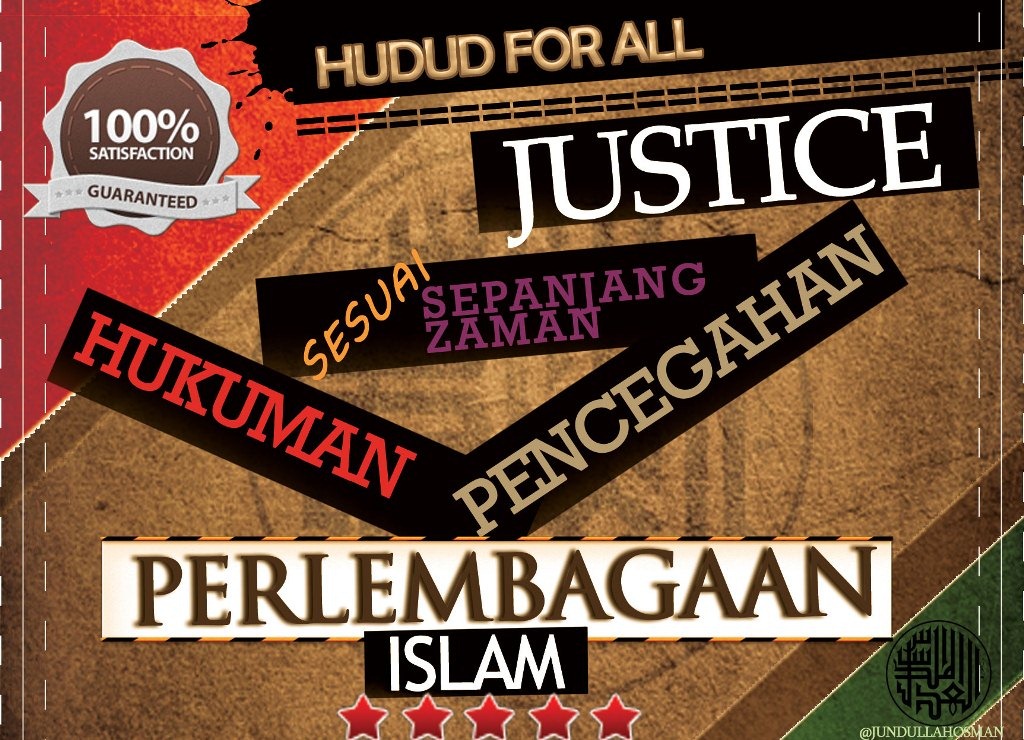Secara kasarnya, saya setuju dgn mesej yg ada dlm gmbr ini. Sepatutnya, gerakan Islam tidak boleh sekadar sibuk dgn agenda hudud sahaja, tetapi mesti selari dgn pelbagai agenda dlm usaha menegakkn negara Islam.
Cuma, klu blh read between the lines, kita blh nmpk yg seolah2 gmbr ini mengatakan bahawa gerakan Islam itu malas dan cuba mencari jalan pintas dlm politik. Itu sgt tidak tepat utk dipukul rata pada semua gerakan Islam, sbb ada sebahagian gerakan yg mmg sudah menerapkan nilai2 Islam (yg merangkumi nilai2 kebaikan di dlm gmbr) dalam orientasi aktiviti mereka. Begitu juga, dinampakkan seolah-olah Hudud tidak selari dengan perjuangan menegakkan nilai-nilai kebaikan tersebut. Hudud menjadi mimpi ngeri semua rakyat Malaysia, walaupun hakikatnya bukan begitu!
Tentang Hudud, saya rasa ada bbrp misconceptions yg perlu dijelaskan.
1. Enakmen Hudud PAS di Kelantan bukanlah merangkumi kesemua hudud yg difirmankn oleh Allah SWT. Sbg contoh, hukuman pada non muslim, mmg thabit dlm hudud dan sudah dibahaskan oleh ulamak silam. Berbeza dgn hudud di Kelantan yg tidak melibatkan non muslim. Mungkin PAS mempunyai perancangan utk menerapkan hudud total scr beransur2. Blh rujuk artikel saya di sini,
http://amarismat.blogspot.com/2014/05/hudud-and-non-muslims.html
2. Hukuman di dalam Islam bukanlah hudud semata2. Ada hudud, qisas, dan ta'zir. Kes wanita yg mengaku zina yg Nabi tak nak hukum dgn hudud beserta dgn hadith yg dinaqalkan dari Aisyah RA (tentang hudud) tidak blh menjadi dalil untuk tidak berhukum menggunakan hukum Islam secara mutlak. Maksudnya, jika tidak dikenakan hukuman hudud, ada lagi hukuman lain yg menanti. Bezanya, hudud ini hukumannya Allah yg tetapkan, ta'zir ditetapkan oleh pemerintah. Seseorang nuga boleh diberi keampunan dan dibebaskan, mengikut budi bicara hakim.
3. Adakah hudud (scr khusus) dan hukuman Islam (scr umum) menjamin kesejahteraan rakyat? Ya, saya amat yakin! Buktinya negara yg mengimplementasikan hudud spt Arab Saudi dan Pakistan mmg antara negara yg kurang kes kecuriannya berbndg negara2 demokrasi. Buktinya (walaupun statistik yg diberikan adalah sekitar 10 thn lepas, tp still valid sbb negara berkaitan sudah implement hudud sblm 2000 lagi)
http://www.nationmaster.com/country-info/stats/Crime/Robberies
Ini menafikan dakwaan Lim Kit Siang yang menyatakan hudud tidak membantu dlm mengurangkan kadar jenayah. Saya tak nafikan masih ada kepincangan dlm perlaksanaan hudud di negara2 tersebut, dan masih ada yang perlu dibaiki.
Kesimpulan yg saya blh berikan, kenapa kita perlu takut hudud utk dilaksanakan, jika kita bukan pencuri, penzina dll? Kerana jika kita bukan penjenayah, kita akan lebih selamat dan bahagia dgn hudud!
Cuma, klu blh read between the lines, kita blh nmpk yg seolah2 gmbr ini mengatakan bahawa gerakan Islam itu malas dan cuba mencari jalan pintas dlm politik. Itu sgt tidak tepat utk dipukul rata pada semua gerakan Islam, sbb ada sebahagian gerakan yg mmg sudah menerapkan nilai2 Islam (yg merangkumi nilai2 kebaikan di dlm gmbr) dalam orientasi aktiviti mereka. Begitu juga, dinampakkan seolah-olah Hudud tidak selari dengan perjuangan menegakkan nilai-nilai kebaikan tersebut. Hudud menjadi mimpi ngeri semua rakyat Malaysia, walaupun hakikatnya bukan begitu!
Tentang Hudud, saya rasa ada bbrp misconceptions yg perlu dijelaskan.
1. Enakmen Hudud PAS di Kelantan bukanlah merangkumi kesemua hudud yg difirmankn oleh Allah SWT. Sbg contoh, hukuman pada non muslim, mmg thabit dlm hudud dan sudah dibahaskan oleh ulamak silam. Berbeza dgn hudud di Kelantan yg tidak melibatkan non muslim. Mungkin PAS mempunyai perancangan utk menerapkan hudud total scr beransur2. Blh rujuk artikel saya di sini,
http://amarismat.blogspot.com/2014/05/hudud-and-non-muslims.html
2. Hukuman di dalam Islam bukanlah hudud semata2. Ada hudud, qisas, dan ta'zir. Kes wanita yg mengaku zina yg Nabi tak nak hukum dgn hudud beserta dgn hadith yg dinaqalkan dari Aisyah RA (tentang hudud) tidak blh menjadi dalil untuk tidak berhukum menggunakan hukum Islam secara mutlak. Maksudnya, jika tidak dikenakan hukuman hudud, ada lagi hukuman lain yg menanti. Bezanya, hudud ini hukumannya Allah yg tetapkan, ta'zir ditetapkan oleh pemerintah. Seseorang nuga boleh diberi keampunan dan dibebaskan, mengikut budi bicara hakim.
3. Adakah hudud (scr khusus) dan hukuman Islam (scr umum) menjamin kesejahteraan rakyat? Ya, saya amat yakin! Buktinya negara yg mengimplementasikan hudud spt Arab Saudi dan Pakistan mmg antara negara yg kurang kes kecuriannya berbndg negara2 demokrasi. Buktinya (walaupun statistik yg diberikan adalah sekitar 10 thn lepas, tp still valid sbb negara berkaitan sudah implement hudud sblm 2000 lagi)
http://www.nationmaster.com/country-info/stats/Crime/Robberies
Ini menafikan dakwaan Lim Kit Siang yang menyatakan hudud tidak membantu dlm mengurangkan kadar jenayah. Saya tak nafikan masih ada kepincangan dlm perlaksanaan hudud di negara2 tersebut, dan masih ada yang perlu dibaiki.
Kesimpulan yg saya blh berikan, kenapa kita perlu takut hudud utk dilaksanakan, jika kita bukan pencuri, penzina dll? Kerana jika kita bukan penjenayah, kita akan lebih selamat dan bahagia dgn hudud!

